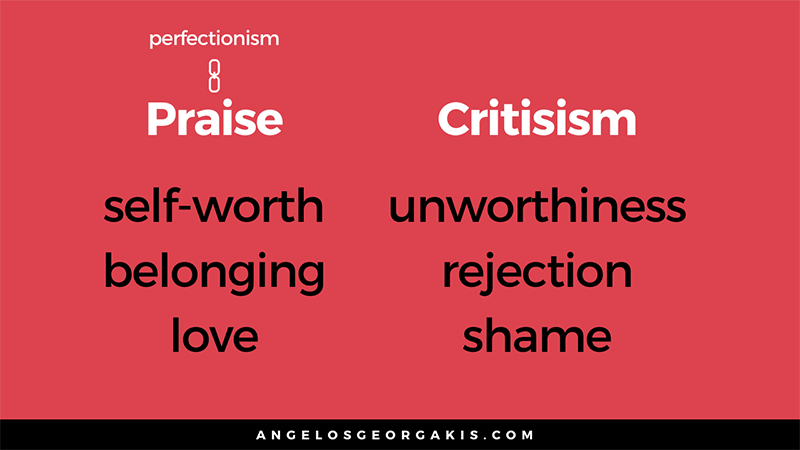In this article, I will show you my 6-step formula that will help you to let go of your perfectionism.
This formula is based on three elements: curiosity, awareness, and compassion.
I’m against changing any behaviour unless ALL the following questions are fully answered:
- What is the behaviour (with specific examples)?
- How does it affect your life?
- Why do you want to change it?
- Is there anything good about it?
- What could the reasons be for adopting this behaviour?
- What would your life look like without this behaviour?
- What exactly do you need to change?
- What would be a realistic and effective plan for changing the behaviour—or introducing a new one?
Perfectionism may create discomfort—emotional and physical pain.
You may have realised that it can sabotage your happiness.
However, a compassionate approach is essential for overcoming perfectionism.
This is a journaling exercise in which you have to answer the questions related to each step.
Don’t rush—you may want to spend an hour a day for the next week or two to complete all the steps.
Let’s get started.
Table of Contents
Step #1: What is it like to be a perfectionist?
You may call yourself a perfectionist but what does that actually mean?
What is your experience of being a perfectionist?
Can you think of any specific examples?
What did you do?
What was the outcome?
How did you feel?
The point of this step is to understand and evaluate this behaviour.
We’re not judging perfectionism at this step—we’re just being curious.
Step #2—Why do you want to let go of perfectionism?
Think about you have given in Step #1.
What could you have done differently—and why?
How would you have felt if you had been less of a perfectionist?
How does perfectionism affect your life in general?
In what ways is it a problem?
Who would you be without your perfectionism?
Step #3—What are the beliefs behind your perfectionism?
In this step, we’ll try to understand the purpose perfectionism serves in your life.
You may need to allow more time on this step as it will require a lot of digging.
To help you, I’ve given you a lot of questions to think about.
The key question we’re trying to answer here is:
What is feeding your perfectionism?
The most common belief is: “I’m not good enough”.
I’m not Good Enough
Has anyone ever said that you’re not good enough?
What was the context?
Not good enough at what?
Was it true?
Why would that person say that to you?
If you’re not good enough, who is?
Is there a way to determine who is good and who is not?
Does “believing you’re not good enough” make you better?
Does this belief make you happier?
Who would you be if you believed that you are good enough?
Is it just you who believes you’re not good enough?
Is there anyone in your life who you may be trying to show that you are good enough?
Perfectionism and Praise
Your perfectionism may come from a need to be accepted, recognised, praised—or loved.
This is absolutely normal.
Praise can motivate you when it focuses on a growth mindset.
Praised by whom?
Someone in your family? A partner, friend, or colleague?
You may say, “I set those high standards”.
However, can you think of someone who would appreciate or reward you for doing a perfect job?
Who is the first person that comes to mind?
It can go back to your childhood.
Praise from your parents maybe?

Perfectionism and Fear of Failure
Perfectionism could be protecting you from failure.
Why would you be afraid of failure?
Everyone can fail but what do you feel when you fail?
Why would it matter if you put a foot wrong?
How would you feel?
Someone else is usually to blame for your perfectionism
Perhaps you have been taught to be a perfectionist—either explicitly or implicitly.
Your parents may have set really high standards for you.
They may have linked your performance to their feelings of self-worth.
They may compare themselves to other parents.
Anxious parents could also be a reason for your perfectionism—”Have I done everything I could to make them feel secure?”
It could be anyone else from whom you could be seeking love and acceptance.
One of my clients said to me: “My parents had convinced me that I should strive to be perfect to please an always disappointed God”.
Another client found that his perfectionism was linked to his mother: the director of the school where he studied. His mother always had extremely high expectations of him because she wanted to be respected by other teachers. She would feel shame if her son wasn’t a top student.
Who has contributed to your perfectionism?
Step #4—Feeling compassion for yourself and those who have contributed to your perfectionism
Those who set high standards for you didn’t do it on purpose.
They most probably did it unconsciously because of their own limiting beliefs.
They didn’t mean to do this to you.
They could also have been victims of this practice—just like you.
Your perfectionism could go back to your parents, grandparents, or older generations.
Can you forgive those people who unintentionally demanded that you should be perfect?
Can you forgive yourself for striving to be perfect in order to receive their love?
Could it be your own false perception of their expectations?
Step #5—Is everything bad about your perfectionism?
You may want to uproot your perfectionism, but if you think about it, you’ll find that it may not have always been a bad thing.
Perfectionism can be healthy if it is derived from conscientiousness or striving for excellence.
However, it can become toxic when it serves as a shield against criticism, judgement or shame.
I’d prefer my surgeon or the engineers who design the self-driving system at Tesla to be perfectionists.
It took me over 100 hours and a few rounds of editing to complete my guide on overcoming anxiety. Could I have produced a good result in half the time? Certainly, but it wouldn’t deliver the same value and experience to my readers.
Perfectionists are often praised as “high achievers” and “detail-oriented” and that feels good momentarily and encourages this behaviour.
So, there may be times when you enjoy being called a perfectionist.
Can you think of examples when your perfectionism led to producing exceptional work?
Can you think of ways perfectionism contributed to your success?
Can you see the difference between good and bad perfectionism in your life?
Step #6—Letting go of perfectionism
If you’ve completed all the previous steps, most of the work is done.
You let go of your perfectionism when you’ve let go of the underlying beliefs.
Remember though that changing a deeply-rooted behaviour doesn’t happen overnight.
When you feel discomfort, anxiety, or negative emotions, pause and ask yourself:
- Is this discomfort a result of my perfectionism?
- Am I using my time wisely?
- Does it really matter to achieve this perfection?
- Could I be spending this time on something else?
Sometimes you’ll find it hard to let go.
That’s OK. In the beginning, all you need is more self-compassion when you have a hard time letting go of your perfectionism.
Self-compassion will help you tap into your unconscious and let those limiting beliefs come up to the surface.
You have to accept your perfectionism first to open the channel for these beliefs to reach the conscious level.
I’ve given you enough questions to work through so I’ll leave you for now before my perfectionism kicks in.
With love, Angelos
P.S. Subscribe to receive exclusive content and tips for anxiety and chronic pain relief, stress management and toxic behavioural patterns. I will also invite you to my free Zoom calls to which you can bring a challenge, a goal or anything you’d like me to support you with.
